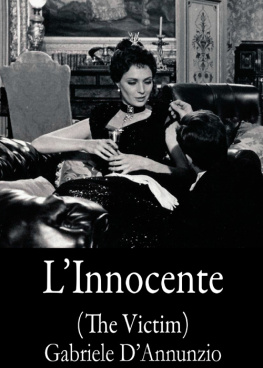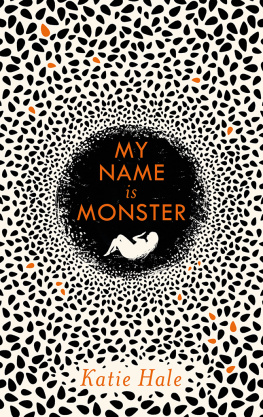murder; the poor little thing would not have died if I had not killed itI, Tullio Hermil, with my own hands. I planned the crime in my own house, and carried it out in the full consciousness of what I was doing, with calm precision and absolute immunity. And afterwards, I continued to live on in my home with that secret in my heart, for a whole yearup till the present day. To-day is the anniversary of the deed. I am here in your hands. Listen to me and judge me I say, can I do this?
I cannot, and I will not. Human justice cannot touch me. No tribunal on earth could pronounce judgment upon me.
And yet the desire is strong in me to accuse myselfto confess. I must unburthen myself to some one.
To whom?
Contents
T O begin, then.
It was April. We had come to the country a few days beforeGiuliana and I and our two children, Maria and Nataliato spend Easter with my mother in her large old country-house called La Badiola. We had been married seven years.
Three years had passed since another Easter which had seemed to me truly a festival of pardon, peace, and love in that same house, white and solitary as a monastery, steeped in the scent of lilacs; when Natalia, our second little girl, was adventuring her first steps and beginning to emerge from the swathing bands of babyhood like a flower from the sheath, and Giuliana was full of kind indulgence towards me, though not without a touch of chastened sadness in her smile. For I had just come back to her, penitent and submissive, after my first grave infidelity. Innocent of the state of affairs, my mother, with her own dear hands, had fastened a branch of olive above our bed and replenished the little silver holy-water vessel that hung upon the wall.
But in the three years between then and now, how much had happened! Between me and Giuliana the rupture had become final, irremediable. My transgressions had heaped themselves up. I had sinned against her in a thousand cruel ways, without remorse, without reserve, driven along by my thirst for pleasure, by the rapid impulse of my passions, by the licentious curiosity of my corrupt mind. I had been the lover of two of her intimate friends. I had openly spent several weeks at Florence with Teresa Raffo and had a duel with the sham Count Raffo, in which my disreputable adversary had covered himself with ridicule through certain unseemly occurrences. And none of these things had been unknown to Giuliana, but she had suffered proudly and almost in silence.
There had been but few conversations between us on the subject, and those of the briefest. I had never lied to her, thinking that by perfect candour I lessened the magnitude of my transgressions in the eyes of this gentle and noble woman whom I knew to be liberal-minded.
I was also aware that she recognised the superiority of my intellect, and that she partly excused my excesses by the specious theories I had frequently propounded to her on the subject of the moral doctrines ostensibly professed by the majority of mankind. The certainty of not being judged by her as an ordinary individual lightened the burden on my conscience. So she too understands, thought I to myself, that, being different from the common herd and having a different conception of life, I am exempt from the laws that others would impose upon me, and can afford to live in the absolute sincerity of my exceptional nature, regardless of the opinion of the multitude.
For I was convinced of being not only a choice but an exceptionally rare spirit, and imagined that the rare quality of my sentiments and sensations lent an added nobility and distinction to my every action. Proud of and interested in this acuteness of sensibility, I was utterly unable to grasp the necessity of any self-control, any more than I ever thought of denying myself one expression, one manifestation of my desires. But at the bottom of all my subtleties lay nothing but stupendous egotism, seeing that while I withdrew from all its obligations I accepted all the benefits of my condition.
In point of fact, piece by piece I had managed to regain my original liberty, and that with Giulianas consent and without any recourse to hypocrisy or degrading subterfuges and lies. I made it as much my aim and object to be open with her as others do to dissemble. I sought on all occasions to confirm between me and Giuliana the new compact of fraternity, of pure friendship. She was to be my sister, my best friend.
My only sister, Costanza, had died at the age of nine, leaving a void in my heart that had never been filled. I often thought with poignant regret of the dear child who had never been able to offer me the tender treasure of her love, a treasure which I imagined inexhaustible. Of all human affections, of all the various kinds of love in this world, that of a sister has always appeared to me the highest and most consoling. And I thought of this lost source of consolation with a sorrow which the irrevocability of death rendered almost mystical. Where, indeed, should I find another sister?
Spontaneously this affectionate aspiration turned towards Giuliana.
Disdaining to share me with others, she had abandoned the slightest approach to a caress, and I, for a long time now, had not felt my senses stir by a hairs-breadth when at her side; her breath upon my cheek, the sight of the two little beauty-spots she had on her neck, left me perfectly cold. It did not seem possible that she could be the same woman I had seen grow pale and faint under the burning ardour of my kisses.
I therefore offered her my brotherly love, and she accepted it quietly. If she was grieved, I was still more so at the thought that we had buried our love for good and all without hope of resurrection, that our lips would perhaps never meet againnever again. And in my crass selfishness I considered that she ought to be grateful to me in her heart for this grief which I felt to be irremediable, and that she should account herself repaid and solaced by it as by a reflection of the love that was lost. Time was, when we had dreamed not only of love but of passion that should last till deathusque ad mortem Yes, we believed in that dream, and how often had we not used those grand and illusory words: For ever! Never! Finally, we believed firmly in the affinity of the flesh, in that mysterious affinity which unites two human beings in the mighty bond of insatiable desire; we believed in it because the keenness of our sensations had in no wise diminished even after the obscure Genius of the species had, by means of us, attained his sole purpose: the creation of a new being.
But that dream had fled, the flame was spent. My spiritI swear ithad wept sincerely over the ruins. And yethow rise up against a necessary phenomenon of nature? How avoid the inevitable?
Thus, it was by great good fortune that, love being dead through the inexorable fatality of natural circumstances and not by any fault of ours, we could still live on together joined by a new sentiment, perhaps no less profound than the old, assuredly loftier and more unusual. We were, indeed, blessed in that a new illusion should succeed the old, and establish between our souls an interchange of unsullied affection, of delicate emotions, and exquisite sadness.
But towards what, in reality, did all this platonic rhetoric tend? Simply to this: that a victim should submit smilingly to the sacrifice.
Plainly, this new life no longer conjugal but fraternalwas entirely based on one presumption: the absolute self-renunciation of the sister. I regained my full liberty, could go in search of those keen sensations which my nerves demanded, could absorb myself passionately in another woman, live my life outside my home and then go back and find my sister awaiting me, find in my rooms a thousand traces of her thoughtful careroses on my table arranged by her hand, all around me the order, the elegance, the spotless brightness of some favourite abode of one of the Graces. Of a surety, an enviable state of things for me! And where find another such pearl beyond price as the woman who thus consented to sacrifice her youth and beauty for me, content to be repaid merely by a kiss of gratitude, almost of religious devotion, on her pure and gentle brow?
Next page








